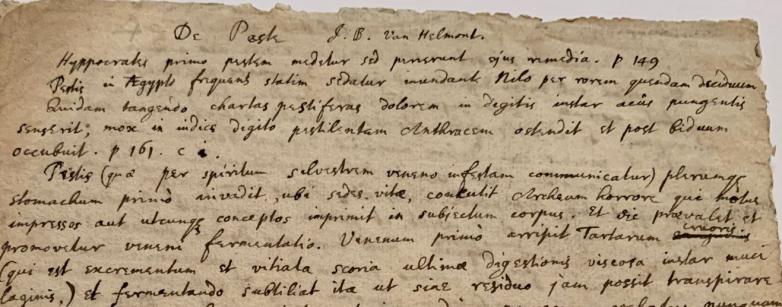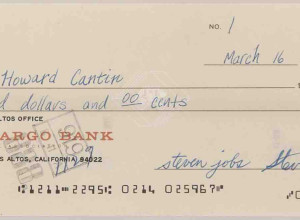Isaac Newton’s Unpublished Notes on the Plague on Offer at Bonhams

An extract from Sir Isaac Newton’s notes on the plague, 1669. Estimate: $80,000-120,000
New York — Pandemics, sadly, are nothing new. The Black Death, for example, lasted on and off from 1331 until the middle of the 18th century. Its last major manifestation was The Great Plague of London, 1665-66, which killed 100,000 people – a quarter of the city’s population – while many more people across England had their lives disrupted. The scientist Isaac Newton was a student at Trinity College, Cambridge when the university closed in 1665 as a precaution against the plague. He didn’t return until 1667. Shortly afterwards, he began his study of chemistry, becoming immersed in the work of Edward Boyle and Jan Baptist van Helmont. Two unpublished handwritten pages of Newton’s notes on Van Helmont’s 1667 book on the plague, De Peste are offered at Bonhams online-only Essential Genius: Ten Important Manuscripts sale which runs from June 1- 10. The estimate is $80,000-120,000.
The manuscript is the most substantial written statement Newton is known to have made about the plague. In analyzing and distilling Van Helmont’s first-hand and medical knowledge, Newton records both causes, modes of transmission, and cures, identifies symptoms and their identification, as well as prescriptions for avoiding the plague. He notes, for instance, the case of a man who having touched “pestilent papyrus, immediately felt a pain like a pricking needle, and developed a pestilent ulcer in the forefinger, and died in two days."
Some of the observations are as clear and simple as the current social distancing instructions “places infected with the Plague are to be avoided…,”. Others will appear very odd to most modern minds. Discussing remedies, for example, Newton writes “the best is a toad suspended by the legs in a chimney for three days, which at last vomited up earth with various insects in it, onto a dish of yellow wax, and shortly after died. Combining powdered toad with the excretions and serum made into lozenges and worn about the affected area, drove away the contagion and drew out the poison.”
Book and Manuscript specialist at Bonhams New York, Darren Sutherland said, “Van Helmont was a great influence on Newton. Newton's notes are essentially his take on the "De Peste," including theories on its causes and speculation about cures. They represent the only significant writings on the subject by the world’s greatest scientific mind that we have been able to trace. A timely reminder, perhaps, that there is nothing new under the sun.”
The sale offers a curated collection of 10 world-class manuscripts celebrating the thinkers and ideas that have transformed the world. Spanning 600 years of history, these manuscripts highlight critical moments in the evolution of western culture. Individually and collectively, they speak to the sensibility and needs of the modern age.
In addition to the Newton manuscript, other highlights include:
• An autographed and signed draft of the final lines of Walt Whitman’s very last poem, A Thought of Columbus. Composed in the months leading up to his death and in expectation of the Columbian Exhibition of 1893, A Thought of Columbus represents a coda to Whitman's lifelong poetic work, his swan song to the American ideal. Whitman began the poem in November 1891, scribbling lines on envelopes, old letters, and odd pieces of paper. The scrap here is on an envelope post-marked Nov 9, 1891, with the original lines that form the end of the poem, followed only by a parenthetical “added word yet to my song,” with significant alterations from the published version, and signed beneath in a similar fashion to the final manuscript. Estimate: $10,000-15,000.
• A beautiful Renaissance manuscript of two of Plato’s greatest dialogues, his Phaedo, known to ancient readers as On the Soul, and his Gorgias, an early manuscript of the translation of Leonardo Bruni. Bound with Bruni’s influential Cicero Novus, as well as a series of important Bruni translations of Demosthenes and Aeschines, this bound compilation represents meditations on mortality and morality, and begins with Plato’s arguments for the immortality of the soul from the point-of-view of Socrates’ death-bed. Renaissance manuscripts of Plato are rare in private hands, with no comparable Bruni-Plato manuscripts recorded at auction in the last 50 years. Estimate: $150,000-250,000.
• Plus: Wittgenstein on Godel; Darwin on Evolution; Twain on Medicine, and an exceptionally rare Lobachevsky’s autograph.















